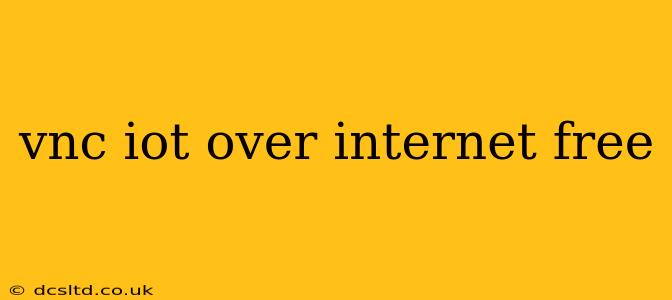The Internet of Things (IoT) is rapidly expanding, connecting countless devices to the network. Managing these devices often requires remote access, and VNC (Virtual Network Computing) provides a powerful solution. However, accessing your VNC-enabled IoT devices over the internet for free requires careful planning and configuration. This guide will explore the options, challenges, and best practices for achieving this.
What is VNC and Why Use it for IoT?
VNC allows you to remotely control a computer or device with a graphical user interface (GUI). This is incredibly useful for IoT devices because it provides a visual way to monitor and manage them, even if they are located remotely. For example, you could use VNC to control a Raspberry Pi running a smart home automation system, or to monitor the status of industrial sensors.
Can I Access VNC IoT Devices Over the Internet for Free?
The short answer is: yes, but with limitations and caveats. While completely free solutions exist, they usually involve trade-offs in terms of security, reliability, or ease of setup. Truly reliable and secure remote access often involves paid services or subscriptions.
What are the Free Options for VNC over the Internet?
Several options allow for free VNC access over the internet, but each carries its own set of challenges:
Using a Dynamic DNS Service and Port Forwarding
This is probably the most common free approach. It involves:
-
Dynamic DNS: Because your home IP address may change, you need a dynamic DNS service (like No-IP or DuckDNS) to provide a consistent domain name pointing to your home network. This is typically free for basic usage.
-
Port Forwarding: You need to configure your router to forward a specific port (typically 5901 for VNC) to the IP address of your IoT device. This allows incoming VNC connections to reach your device.
Challenges: This method requires technical expertise to configure your router and DNS settings. Furthermore, it can expose your device directly to the internet, increasing security vulnerabilities if not properly secured.
Using a VPN (Virtual Private Network)
A VPN can create a secure tunnel between your device and the internet, adding a layer of security when accessing your VNC server. Many free VPNs exist, but they may have bandwidth limitations, slower speeds, or fewer server locations.
Challenges: Free VPNs often come with limitations on bandwidth, speed, and server locations. Also, some free VPNs have been known to compromise user privacy. Always research thoroughly before using a free VPN.
What are the Security Risks of Free VNC Over the Internet?
Accessing VNC devices over the internet inherently presents security risks. Free methods often lack robust security features, making your devices vulnerable to unauthorized access and potential attacks. Without proper security measures, attackers could gain control of your device and potentially compromise your network.
How Can I Improve Security When Using Free VNC Over the Internet?
Even with free methods, you can take steps to improve security:
- Strong Passwords: Use strong, unique passwords for your VNC server and router.
- VNC Encryption: Ensure VNC encryption is enabled to protect the data transmitted between your device and the client.
- Firewall: Configure a firewall on your router and device to restrict access to only necessary ports.
- Regular Updates: Keep your VNC server and operating system updated with the latest security patches.
What are the Alternatives to Free VNC Over the Internet?
If security and reliability are paramount, consider paid services offering:
- Managed VNC access: These services handle the complexities of networking and security, providing a more secure and reliable remote access solution.
- Cloud-based VNC: Cloud-based VNC solutions offer enhanced security and scalability, often at a cost.
Conclusion
Accessing your VNC IoT devices over the internet for free is possible, but it comes with significant security considerations. While free options exist, carefully weigh the security risks against the convenience. For critical applications or sensitive data, paid services offer superior security and reliability. Always prioritize security best practices to protect your devices and network.
